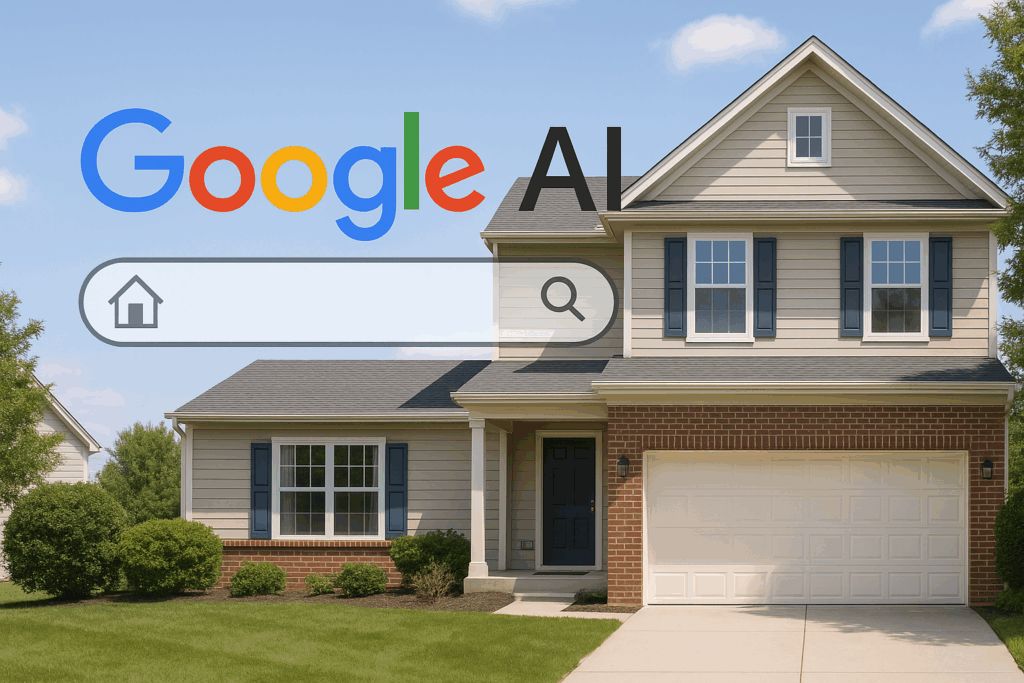Imagine a prospective buyer saying: “Find me a modern 3-bed villa near the coast, with green views and natural light.” What if the search result they see is an immersive snapshot of matching homes, street views, recent sales trends, and direct contact options all without forcing them to click through dozens of listings? That’s the potential of Google’s AI Mode, and for SOLD, it’s a game changer.
Here’s how AI Mode is poised to rewrite the property search experience and how SOLD is ready to adapt, lead, and thrive.
What Is Google’s AI Mode (And Why It Matters for Real Estate)
Google introduced AI Mode as an experimental new search experience that extends the idea behind AI Overviews. Rather than simply surfacing a generation of short summaries above search results, AI Mode offers a conversational layer: you can ask follow-ups, mix in images, and refine a search as if you were talking to a human.
One of the key upgrades in Google’s AI Mode is multimodal search: you can supply text + images, or evolve your query step by step (e.g., “show me coastal villas,” then “ones with curved balconies”) and the system updates accordingly.
In effect, buyers stop thinking in rigid filters like “3 beds, 2 baths, price < X.” They just describe what they want and AI Mode parcels out options that align with that vision.
In real estate terms, this is a shift from searching via attributes to searching via imagination.
Why This Matters to SOLD

At SOLD, our mission is to make property discovery fluid, intuitive, and deeply human. Google’s AI Mode accelerates toward that vision but also raises new imperatives:
- Reduced clicks, more visibility
AI Mode’s summaries (with visuals and context) reduce the need for users to click into individual pages. Traditional click-through rates may decline.
For SOLD, this means we must optimize so our brand, listings, and trust signals are visible within the AI summary itself. - Structured, machine-readable content becomes table stakes
AI systems prefer content they can parse easily. That means clean data, clear schemas, robust metadata, and contextual captions. SOLD’s listings should be designed not just for human readers, but for AI crawlers.
SOLD has already launched specialized services in this space: their AI Search Optimization for Real Estate Brands offering helps real estate entities make their listings AI-ready. - Conversational content is the new SEO
Because AI Mode expects natural queries, content needs to be conversational and anticipatory. Instead of rigid keyword stuffing, it’s about anticipating what a buyer might ask next and embedding that logic in FAQs, descriptions, and narrative pages. - Branded trust matters more than ever
If the buyer never clicks through to a site, then seeing that a recommendation says “via SOLD” or “SOLD-verified” becomes a critical differentiator. We need to ensure our brand is tied to high-authority signals (reviews, endorsements, depth).
What Changes for Buyers Searching on SOLD
Because SOLD is attuned to market-leading trends, here’s how the buyer experience will evolve with AI Mode:
1. Search by vision, not filters
Envisioning a property “light-filled villa with a rooftop garden” becomes a natural prompt. The AI compiles options directly from SOLD’s curated inventory, matching style, ambience, and locale, not just based on beds and baths.
2. Smarter previews
Instead of the typical gallery + bullet list, buyers may see a compact snapshot including:
- Aerial view
- Price trends in that neighborhood
- Nearby amenities
- Similar alternatives
- Contact button
All of that, before clicking deeper.
3. Visual follow-ups
A buyer might upload a photo of a façade they like (say, a villa with arches) and ask SOLD (via AI Mode) to show similar styles nearby. This tight feedback loop between image and property inventory is powerful.
4. Less friction in trust
AI Mode can integrate trust signals (e.g. how many times SOLD has sold in that area, customer reviews) directly into its answer. A buyer feels confidence early on without needing to navigate multiple pages.
The Tech Backbone: What SOLD Must Invest In
To stay ahead, SOLD must double down in several key areas:
Structured valuation & AI models
Emerging research is pushing real estate valuation toward structured, machine-readable formats: combining imagery + numeric attributes + neighbourhood data in AI models. SOLD should build or partner with systems that produce those structured insights so when AI Mode aggregates data, our properties are well represented.
High-quality multimodal content
High-resolution photos, floorplans, 3D models, drone shots all tagged, captioned, and structured. This gives AI more “hooks” to pull from when creating its summaries.
Conversational content design
Rewrite property descriptions, blog content, FAQ pages all in a way that anticipates buyer questions and “conversational flows.” This isn’t casual writing, it’s thoughtfully dialogic.
Action Plan: How SOLD Leads the AI-First Shift
- Audit and enrich all listing data
Ensure every property in SOLD’s catalog has structured fields, alt text, captions, geocodes, and relevant metadata. - Develop “query chains”
Map buyer journeys: what might they ask first, second, third? Then build content that addresses those chains in order. - Optimize brand imprint
Wherever AI summarizes surface listings, SOLD’s name should appear as a trustworthy source. Build brand signals via reviews, authority, domain strength. - Train staff to think AI-first
When agents or marketers describe properties, they should naturally use language that aligns with conversational, visual queries. - Monitor, iterate, evolve
Track shifts in impressions, buyer query types, and engagement. Be ready to pivot if AI Mode prioritizes certain formats more than others.
Envisioning the Future Buyer Journey via SOLD + AI
A buyer might open Google AI Mode and say:
“Show me a modern beachfront villa, under AED 10 million, with a sea view and an outdoor kitchen.”
What they see may be:
A SOLD-branded visual preview of matched villas
A small slider of nearby alternatives
Neighborhood insights (noise, walkability, sunrise direction)
A call-to-action like “Contact SOLD for a private tour”
Because the buyer may never have clicked through to a separate portal, SOLD’s presence within that AI response matters more than ever.
When follow-up, the buyer can ask:
“Show me three of those in Jumeirah with garden space.”
AI Mode responds instantly curated, filtered, visual as if conversing with a human agent.
In that world, the property search journey is shorter, richer, and more intuitive.
Final Thought
Google’s AI Mode is not merely a nicer interface. It’s a signal that search is evolving from hyperlinks to conversational, visual, integrated responses. For SOLD, that change is not a threat: it’s a golden opportunity to lead.
By building listings and content optimized for AI, by tying our brand into the answers themselves, and by staying deeply human in our customer relationships, SOLD is positioned not just to adapt but to shine.









